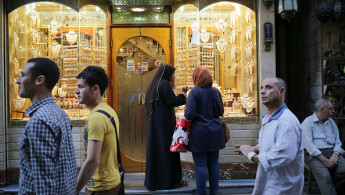Egypt’s gold market marred by uncertainties after months of increased demand
As the value of the Egyptian pound dropped tremendously against the US dollar after the government's controversial economic measures, thousands of citizens resorted to purchasing gold to preserve the value of their savings in local currency, which led the prices of the precious yellow metal to skyrocket for weeks.
By early May, the Egyptians' mania for gold, especially coins and gold bars, which can be resold involving little labour costs, witnessed an over 50 per cent rise compared to the beginning of the year.
Last week, a report released by the World Gold Council revealed that demand for gold in Egypt doubled, amounting to seven tons in the first quarter of 2023. During this time, Egypt has been ranked fifth in the world in the high demand for gold bars and coins.
"Such excess demand occurs when the quantity demanded is greater than the amount supplied at the given price and has led to a crisis in the market. Hence, there is no equilibrium price – a balance of supply and demand factors," economic researcher Mohamed Magdy told The New Arab.
The rising demand caused a shortage in the supply, causing most gold stores to delay getting paid the total amount, often 'booking' the bars or coins for customers to receive about weeks later. At the same time, the demand for gold jewellery has stabilised.
Customers could be liable to pay more than the sum they paid to book the pieces when they received them based on the market value at a given time.
Meanwhile, government officials recurrently called on citizens to halt buying gold so the market could stabilise.
Last week, the gold market took a downturn after the government approved to the exemption of Egyptian travellers from customs tariffs upon arriving in Egypt if they were carrying gold for personal use and asked them to only pay the value-added services (VAS) after presenting purchase receipts.
The government's decree came after several attempts by travellers to traffic gold inside the country were foiled at Egyptian airports in recent weeks.
Economists believe that the government's move led to a drop in the price of gold in the local market as of Saturday by over 400 Egyptian pounds (about US$13) per gram.
"This call came just in time to create a state of balance and control the market. In some countries such as Saudi Arabia, gold is cheaper than Egypt, which made Egyptian expatriates put their savings in gold rather than transfer money to banks in the country in the form of foreign currencies," Magdy explained.
"For the equilibrium price to occur, either the demand or the supply, or both, has to shift or move. I believe the government should create a centralised database of buyers linked to all gold shops in the country and impose a quota for citizens to buy at a given period, for example, every month, to control the market," he argued.
The price of one gram of 21-Karat gold, the most popular in Egypt, is worth 2,300 Egyptian pounds (about US$75), while it is valued at the equivalent of 1,752 Egyptian pounds (about US$57) in Saudi Arabia, excluding the labour costs, at the time of publishing.
"The price of gold in the country's market is determined by several factors: the value of the US dollar, the supply and demand as I explained earlier, and the market's response to inflation and the policies taken by the central bank," Magdy explained.
One jeweller, who declined to be named, told TNA, that the prices of gold in Egypt are based on the US dollar value in the parallel, informal market, not the official price.
The US dollar officially equals about 30.90 Egyptian pounds. However, according to a trader, who spoke to TNA on condition of anonymity, it is valued at 40.5 EGP in the parallel market at the time of publishing.
"Until early last week, the gold was priced based on a dollar price of almost EGP 50, that’s even higher than the informal traders value it," a gold shop owner told TNA on condition of anonymity.
The rising prices of gold over the past decade have hurt an Egyptian centuries-old tradition among middle-class households.
TNA also visited Egypt's old Souq El-Shagha (the goldsmiths' market) which lies in the heart of the centuries-old Islamic Cairo, one of the region's oldest dating back to the Fatimid era.
A woman told TNA that she no longer buys jewellery as she was asking the jeweller when she could receive a 20-gram gold bar.
"At the time of an economic crisis, not all women are interested to look fancy anymore. We care about keeping savings for our children," she said.
An experienced jeweller told TNA that "most Egyptians currently refrain from buying jewellery, albeit 'shabka' used to be the most important element in marriage." A "shabka" is a traditional gift, mostly in gold, and in some cases in diamond, offered to the bride or the fiancée, whose worth is based on the suitor’s financial capability as well as the social class of the couple.
"Nowadays most of the profit we gain from gold is through selling coins and bars rather than jewellery," the 75-year-old jeweller concluded.





 Follow the Middle East's top stories in English at The New Arab on Google News
Follow the Middle East's top stories in English at The New Arab on Google News


